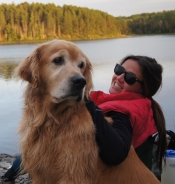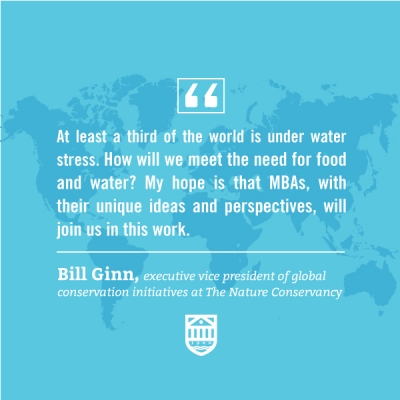
 By Kelly Thompson T’17
By Kelly Thompson T’17Kelly Thompson T’17 is originally from San Francisco. Prior to Tuck, Kelly worked in investment banking at Bank of America Merrill Lynch and as the assistant director of corporate relations at the American Museum of Natural History. Kelly spent her summer working at The Nature Conservancy focused on impact investments in water.
I had the opportunity to be the student lead for Bill Ginn, executive vice president for global conservation initiatives at The Nature Conservancy (TNC) and Tony Grassi, former chairman of TNC’s board, during their visit to Tuck. Many of us attend Tuck because we have a desire to spend time in nature. While many Tuck students love the call of the outdoors, most do not end up pursuing careers in that space. However, after Bill and Tony’s visit, many of my fellow students began to think about how they could use their business acumen to preserve the natural world.
During their visit, my classmates and I had the chance to learn more about Bill and Tony’s backgrounds and develop a deeper understanding of The Nature Conservancy’s impact investing work.
Bill began his career at the Audubon Society in Maine. There, he started a farm with his wife and saw an opportunity that others did not—finding farmers to buy waste for fertilizers. Bill eventually built a multi-million-dollar company in waste management. He then specialized in waste management M&A, describing it as an amazing opportunity for him to learn valuable financial skills. Bill spent the last 18 years at TNC in several different capacities. During this time, he wrote Investing in Nature, which outlines how to use business tools and market-based strategies to conserve nature. Now, he says he has “the coolest job in the world” (and I have to say I agree), working on special initiatives for The Conservancy. One of these initiatives is NatureVest, the Conservancy’s impact investing arm.

As Bill described to Professor Curtis Welling’s Business and Society course, there is a 290 billion dollar funding gap for conservation. TNC saw an opportunity to employ private capital as a means of reducing the funding gap. NatureVest was created to structure and execute deals that produce conservation outcomes and generate financial returns. The company has launched five innovative efforts to advance impact investing in conservation, including: sustainable forestry, fishing acquisition quotas, green infrastructure, water funds, and debt restructuring.
Unlike Bill, Tony started his career on Wall Street. It wasn’t until after he retired that he became deeply involved in the conservation space. Tony served on multiple TNC boards and ended his time as the chairman of the international board. He continues to be very active in his local Maine community. Tony is the visionary and project manager behind the Mill at Freedom Falls in Freedom, Maine. His vision was to restore the water mill to preserve the historic building, and bring economic life back into the community in an environmentally friendly way, in terms of providing hydropower and not disrupting the natural ecosystems. The Mill is now up and running and houses arguably one of the best restaurants in Maine, The Lost Kitchen. I plan on gathering a group of students to visit in the spring.
As someone passionate about building a career in the conservation investment space, it was exciting for me to see the “business school in the woods” engage in a real discussion on the intersection of business and conservation. I can’t wait to keep the dialogue going.
The Center for Business, Government & Society is focused on meeting the evolving complexities facing business leaders in today’s global economy. In the context of globalization and technological advancement, business success increasingly depends on reconciling the interests of its immediate stakeholders with the broader, deeply intertwined interests of both governments and society. Business leaders adept at navigating these many interests will be better equipped and empowered to help build a more sustainable global economy.